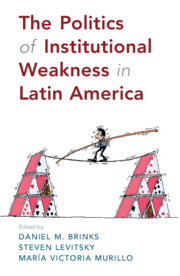Book contents
- The Politics of Institutional Weakness in Latin America
- The Politics of Institutional Weakness in Latin America
- Copyright page
- Contents
- Figures
- Maps
- Tables
- Contributors
- Acknowledgments
- 1 The Political Origins of Institutional Weakness
- 2 When (Electoral) Opportunity Knocks
- 3 The Stickiness of “Bad” Institutions
- 4 Presidential Crises in Latin America
- 5 Coercion Gaps
- 6 Aspirational Laws as Weak Institutions
- 7 The Social Determinants of Enforcement
- 8 A Multilevel Approach to Enforcement
- 9 What/Whose Property Rights?
- 10 Imported Institutions
- 11 Social Origins of Institutional Strength
- 12 Conclusion
- Bibliography
- Index
9 - What/Whose Property Rights?
The Selective Enforcement of Land Rights under Mexican Liberalism1
Published online by Cambridge University Press: 06 May 2020
- The Politics of Institutional Weakness in Latin America
- The Politics of Institutional Weakness in Latin America
- Copyright page
- Contents
- Figures
- Maps
- Tables
- Contributors
- Acknowledgments
- 1 The Political Origins of Institutional Weakness
- 2 When (Electoral) Opportunity Knocks
- 3 The Stickiness of “Bad” Institutions
- 4 Presidential Crises in Latin America
- 5 Coercion Gaps
- 6 Aspirational Laws as Weak Institutions
- 7 The Social Determinants of Enforcement
- 8 A Multilevel Approach to Enforcement
- 9 What/Whose Property Rights?
- 10 Imported Institutions
- 11 Social Origins of Institutional Strength
- 12 Conclusion
- Bibliography
- Index
Summary
Strong property rights tend to be considered a crucial condition for almost all that is good, including economic growth, peace, state capacity, even democracy. However, not all types of property rights institutions are considered capable of achieving these purposes. It is often assumed or argued that property rights – or at least the right kind of property rights – are liberal ownership rights, which can only be held by individuals, are transferable and allocable only through market forces, and are secure from state expropriation or intervention.
In this chapter, we chronicle the “activation” (Levitsky and Murillo 2014) of individual property rights in Mexico, driven by liberal ideology and enabled by increased state capacity, with indigenous groups resisting the elimination of their collective rights and wealthy landowners (hacendados) pushing to turn the process to their advantage through biased enforcement.
- Type
- Chapter
- Information
- The Politics of Institutional Weakness in Latin America , pp. 208 - 234Publisher: Cambridge University PressPrint publication year: 2020

